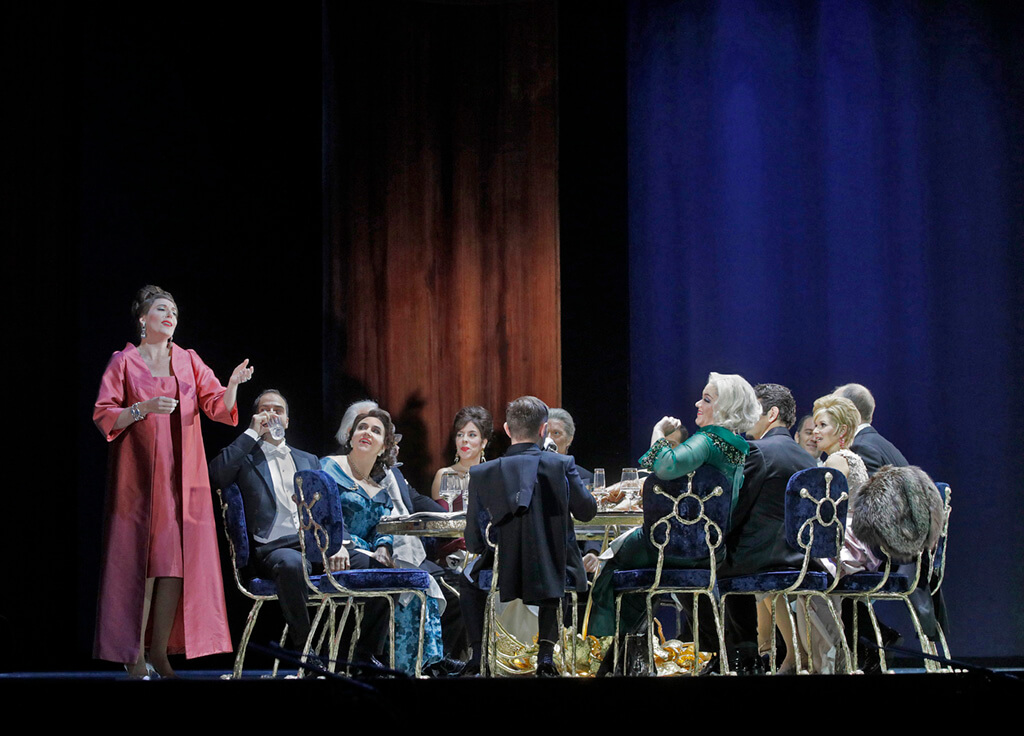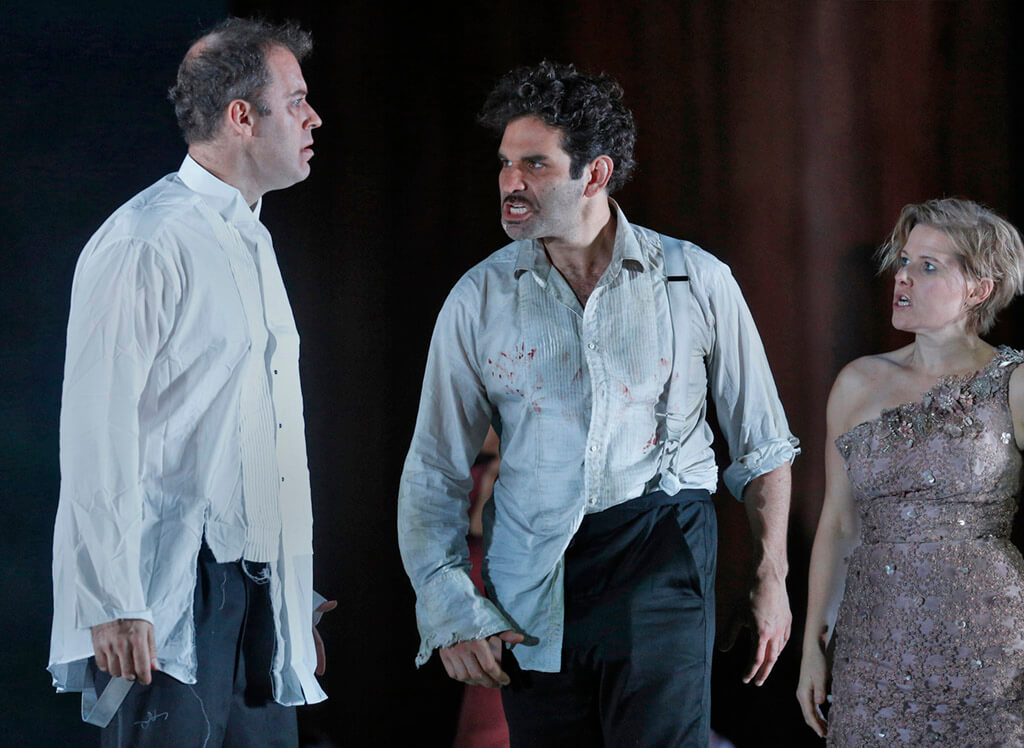
It’s common knowledge that the Metropolitan Opera audience is famously conservative when it comes to musical taste. For many of them, they’d rather go to their 20th La Traviata before attending their first contemporary piece. That said, with Peter Gelb as its General Manager since 2006, he has slowly brought the Company into the 21st-Century, by introducing nine contemporary operas by such composers as John Adams, Philip Glass, and Kaija Saariaho, not to mention concept-driven staging that’s the norm in Europe.
As a frequent visitor to the Met, I do hear grumbling from the traditionalists in the audience, but I’ve also noticed a significant segment of attendees who find the new pieces refreshing. While overall Met attendance has been down the last few seasons, it’s not because of new music. Audiences do appreciate contemporary operas when given fine singing and thoughtful staging. Such 20th-Century masterpieces as The Nose and From the House of the Dead, new to the Met, received acclaim from audience and critics alike.
Continuing in that tradition is British composer Thomas Adès’s The Exterminating Angel, currently on stage at the Met with the composer on the podium. The world premiere took place at the Salzburg Festival in 2016, followed by a run at the Covent Garden in April of this year. This run at the Met is its North American premiere. It opened on Oct. 26 to nearly uniform praise. Attendance has been excellent; I dare say better than some of the standard repertoire pieces.
Adès’s first opera that put him on the map was Powder Her Face, a chamber work from 1995 that gained notoriety for its rather salacious plot, based on Margaret, the Duchess of Argyll. Don’t take my word for it – the piece is commercially available on DVD. His second opera, The Tempest, an adaptation of Shakespeare’s play, which I was fortunate to see at its American premiere in Santa Fe back in 2006. It arrived at the Met five years ago, in a co-production with Opera de Quebec directed by Robert Lepage.
Adès’s third opera, The Exterminating Angel, is inspired by Luis Buñuel’s 1962 surrealist film of the same name. The libretto by Tom Cairns is very faithful to the original, with a huge ensemble cast of fifteen principals. The curtain rises to reveal an opulent post-opera dinner party, attended by well-heeled guests. For unfathomable reasons, all of them find themselves unable to leave afterwards. It’s not clear why they cannot leave, but then that’s Buñuel’s absurdism at work! Without giving too much of the story away, with hours and days passing, conditions deteriorate, and everyone – save for the doctor — descends into madness and chaos as their base instincts come to the surface.
If you are like me, with your psyche firmly grounded in reality, it’s a challenging premise. I have to remind myself what’s an opera without some element of unreality? And I say that with my tongue firmly planted in my cheek! How well would a universally acclaimed movie translate to the opera stage? To be sure, Adès certainly has the affinity for the surreal and the absurd, if you’ve seen his two previous operas. I tuned into the opening night broadcast on satellite, curious to see how well his musical idiom would work. Now, we’ll get a chance to experience it visually, in the Met Live in HD this coming Saturday, seen in select Cineplex cinemas in Canada.
There are two Canadians in the cast — Joseph Kaiser (Edmundo de Nobile) and Frédéric Antoun (Raúl Yebenes). I took this opportunity to ask Antoun a few questions about his experience singing in The Exterminating Angel, since he created the role:

You were in the original world premiere cast in Salzburg in 2016 and earlier this year in Covent Garden. Was that your first world premiere? How does it feel to be the first in creating a role?
It was [my first world premiere] at the time! I since then also premiered Brian Current’s The Seven Heavenly Halls in October 2016 with the OSM and Kent Nagano.
It feels great because you rely simply on the text, on yourself and of course the way it is set to music. Tom Adès almost never made any suggestions besides what is already written in the score. I think it is a masterpiece. In addition to this, since it is an ensemble piece and the other singers are creating their roles as well, you have a wonderful opportunity to come up with something symbiotic.
What are your thoughts on your role in the opera?
Well, Raúl is an explorer and a free thinker. He is also quite vulgar, naughty and impulsive. He follows no one except himself and he likes to stir things up. There are a few differences with the way he is played in the movie, but overall it is quite faithful to the spirit of the character.
Since you premiered the role, did Ades write Raúl Yebenes specifically with your voice in mind?
Yes, he did. I sang Caliban in his opera The Tempest in Quebec City a few years ago, and it was one of my best experiences. Caliban is still one of my favourite roles in all the opera repertoire.
Have you been working closely with the composer in this revival here at the Met?
Yes, Thomas was there at every single rehearsal since the beginning.
Does Adès write gratefully for the voice?
Hmmm… It depends on what you mean by that, haha! I think that Thomas likes the voice to express the darker corners of the human psyche. This is why he writes in extreme registers. He loves hysteria, humour, and drama; a true theatrical composer. I believe that to him it’s more important for the voice to express something than to have a pleasant sound.
Is his music challenging to sing?
Yes, very much so. He makes us jump to one extreme of our register to the other, and he insists on the text being very intelligible. Not always easy to combine!
I’ve seen video clips of the production from both Salzburg and Covent Garden. The vocal writing strikes me as very challenging. What are your thoughts on your role in the opera?
The writing is indeed challenging as he loves to make Raúl sing in the highest register. In this opera, I have several high Cs, high Ds and even a high E! Besides that, high B flats and Bs are so common they feel like Raul’s middle voice!
I like the role. I would have preferred more lines or more lyrical passages, but it’s still a lot of fun to sing. You have to be on your toes all the time though. You’re quiet for 10 minutes, and then you must sing several high notes with no preparation. Bam! You have no second chances.
What are your thoughts on singing contemporary music in general?
I love it. It’s more work to learn the piece but there is something quite exciting, and it is often a true privilege to serve composers of the highest calibre. I’m happy when they’re happy!
Some singers I’ve spoken to feel they don’t want to sing too much new music, as it is hard on the voice. Do you think it’s true? Or is it a myth? What are your thoughts on this? Does new music make different demands on the instrument?
Yes, most of the new music I have sung was harder on the voice because it’s less linear. There are more jumps; it’s often more pointillistic and expressionistic, less lyrical. You need a solid technique if you don’t want to fatigue or damage your instrument.
Do you do anything to protect your voice in contemporary music that’s different from singing the standard repertoire?
Yes, I don’t sing anything else when I’m in the middle of a contemporary music production, especially Adès. It is so unlike the standard repertoire that if you try to do both at the same time, one or likely both will suffer.
Have you seen the Luis Buñuel 1962 movie that the opera is based on? What do you think of the movie? Your thoughts on the surrealist genre in film? In Opera? Do you find Adès is faithful to the spirit of the Buñuel original?
Yes, I saw the movie a couple of times. It was very bold at the time and is still fun to watch. My mother remembers seeing it when it came out, and it had a profound impact on her! I don’t have any thoughts about the genre. I like anything that is well made, and you can have that with any genre. It’s the same with people! Everyone has something to offer.
Yes, I believe Thomas is very faithful to the spirit of the movie. In addition to being a cultured man, he has such a great sense of humour and a colourful mind. I think that is the most important thing in surrealism, and his work is a reflection of himself!
Thank you so much Frédéric. Toi toi toi for the Saturday Met Live in HD!
Thank you, Joseph! It was a pleasure!
— — — — —
To hear the Met’s The Exterminating Angel Live in HD, see here.
#LUDWIGVAN
Want more updates on Toronto-centric classical music news and reviews before anyone else finds out? Follow us on Facebook or Twitter for all the latest.
![]()
- SCRUTINY | Opera Atelier’s All Is Love Makes Triumphal Return - April 15, 2024
- SCRUTINY | From The Heart: Ema Nikolovska And Charles Richard-Hamelin Offer Unique Program At Koerner Hall - March 26, 2024
- SCRUTINY | The Glenn Gould School Spring Opera Presents A Superb Dialogues Des Carmélites - March 22, 2024



